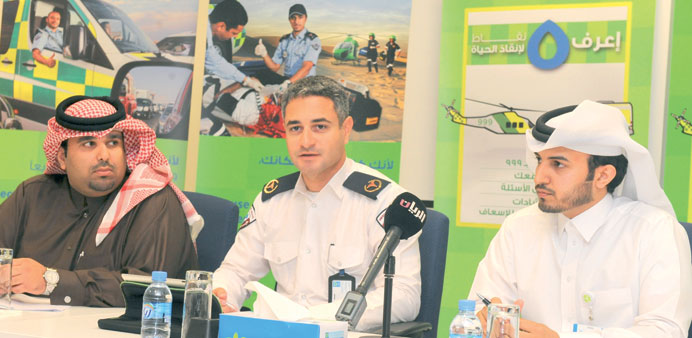By Noimot Olayiwola/Staff Reporter
The Ambulance Service at the Hamad Medical Corporation yesterday launched a new campaign ‘Know the 5 steps to Save a Life’, urging residents to follow a five-step action plan in case of a medical emergency. The five steps are: dial 999 immediately; know your location; answer all questions; follow all instructions; and give way to ambulances on the road.
Ambulance Service chief executive officer Dr Robert Campbell Owen said: “We are grateful for all the public does to help the Ambulance Service save lives. We hope that by providing them with five simple ways they can continue to support us that we can further enhance our service.
“The Ambulance Service is a national service for Qatar and we want to make sure it is as efficient and effective as possible. To do this we need the public’s support - help us help you.”
The campaign is being planned in order to further raise awareness of the critical role the Ambulance Service is playing in the community.
HMC Ambulance Service operations manager Ali Darwish Karbon Abdulla said in a press conference yesterday. “People are being urged to dial 999 immediately in case of an emergency because the Ambulance Service will not know to send help until they are called,” he said, explaining that when people call for an ambulance, it is essential that they know where they are and they should be able to describe it clearly to the person taking the emergency call.
“This means ambulances can find patient much quicker when people are able to mention their nearest landmarks or any road names as the GPS can co-ordinate all these if callers know them,” he elaborated.
Abdulla also explained that during a 999 call, the caller will be asked many questions as they determine what team the Ambulance Service will send to assist the patient in order to ensure that the patient gets the best possible care.
“It is very important that the caller stays on the line to provide the answers,” he said..
The official explained further that during a 999 call, it is possible that the caller can do something to help the patient until the ambulance arrives or to help the ambulance get to the patient, like waiting on the road to signal to the driver or clearing the driveway of cars to allow the ambulance access to the house or compound.
“It is important that the caller follow any instructions carefully as this could help save a life,” he stated.
According to Abdulla, when an ambulance is on its way to an accident, it will put on flashing lights and sirens to signal it is an emergency. “To help the ambulance get to the accident as quickly as possible, the Ambulance Service is asking drivers to move over and let the ambulance go past, even if there is a red light,” Abdulla said.
To a question on action to take in case a motorist get violation while giving way to ambulance, especially at signals, the official said: “Giving way to ambulance is vital because reaching a patient on time and be able to save their lives requires seconds and not even minute.
“So, if a car receives violation for jumping red light while giving way to ambulance, we have a way of handling such cases if the motorists approach us after the incident.”
The Ambulance Service presently has over 100 ambulances, of which 50 are brand new and up and operate round-the-clock. There are plans to increase the number of daily operational ambulances to 65, he said.
“Previously, we have two distribution modules for operating our ambulances-for both summer and winter periods and now we have a third module for responding during major events such as National Day celebrations and National Sports Day,” Abdulla said.
He mentioned that the Ambulance Service, which has a ‘hub and spoke’ response strategy, has six hubs located according to the geographical map of the country including two in Doha.
“The hub and spoke system is enabling us to dispatch ambulances rapidly to any part of the country and our administrative activities are related to the hub. Now, we have a new type of spoke based on a new technology being run since one year now. This is under evaluation,” he explained.
There are plans to increase the number of hubs significantly during this year, he said while also mentioning the plans to increase the number of languages being spoken at the National Command Centre, which is taking the calls for the ambulance services.
“Presently, the call centre is multi-lingual with English, Arabic, Urdu and Tagalog and we are speaking with the Ministry of Interior on including more languages being spoken by other expatriates in order to facilitate our work,” said Ambulance Service public relations manager Rashid Andaila.

Flanked by Andaila (right) and the HMC Corporate Communications department’s media director Hassan al-Hail, Abdulla addresses the press conference yes
